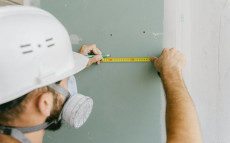- pathfindersAI
- Job Profile
Carpet Installers
Summary
Carpet Installers: Crafting Comfort Beneath Our Feet
What They Do
Carpet installers play an integral role in enhancing both the aesthetic and functional aspects of residential and commercial spaces. These skilled professionals are tasked with the meticulous process of measuring, cutting, and laying carpet to ensure seamless installation. Whether rejuvenating a tired living room or outfitting an entire office building, carpet installers bring expertise that transforms spaces into comfortable and welcoming environments. Their work not only contributes to the visual appeal but also to the acoustic and thermal insulation of interiors, making their role vital in construction and renovation projects.
Job Responsibilities
The duties of carpet installers encompass a broad spectrum of tasks, beginning with the pivotal initial stage of measurement and assessment of the installation site. This preparatory phase ensures that accurate dimensions are obtained and potential obstacles are identified. Subsequently, installers prepare the surface, which may involve cleaning, leveling, and applying adhesive. The core of their job lies in expertly cutting carpet sections to match room contours and fitting them snugly. Installers must adeptly stretch and secure the carpet to eliminate wrinkles and ensure durability. Post-installation tasks often include trimming excess material and conducting quality checks to guarantee that the finished product meets client specifications and industry standards.
Essential Skills
Possession of a specific set of skills is paramount for success as a carpet installer. Precision and attention to detail are at the forefront, as even minor inaccuracies can compromise the overall look and longevity of the installation. Physical stamina and dexterity are crucial, given the physically demanding nature of the work that often requires kneeling, stretching, and lifting. Problem-solving abilities enable installers to address unforeseen challenges that may arise during the installation process. Moreover, strong communication skills facilitate effective interaction with clients and team members, ensuring that expectations are met, and satisfaction is achieved.
Educational Pathways
The journey to becoming a proficient carpet installer can follow multiple educational routes. While formal education is not always a prerequisite, many installers benefit from completing a high school diploma or its equivalent. Hands-on experience holds significant value in this field; thus, aspiring professionals often pursue apprenticeships or on-the-job training programs that provide practical knowledge and skill development under the mentorship of experienced installers. Additionally, enrolling in vocational schools or technical colleges that offer specialized programs in flooring installation can bolster one’s expertise and marketability. Certification through industry-recognized bodies, although not mandatory, can enhance credentials and prospects for career advancement.
Career Prospects
Carpet installation offers a rewarding career with varied opportunities. As building and renovation activities continue to thrive, the demand for skilled carpet installers remains robust. Experienced installers may progress to supervisory positions, overseeing larger projects or managing installation teams. Some choose the entrepreneurial route, establishing their own businesses and enjoying the autonomy it affords. The versatility of the skills gained in carpet installation also allows for transitions into related fields such as floor covering or general contracting, broadening the horizon for career growth and diversification.
Conclusion
The vocation of a carpet installer is a blend of technical proficiency, physical perseverance, and a keen eye for detail. From prepping installation sites to executing flawless carpet fitting, these professionals are indispensable in creating inviting and functional interiors. By mastering essential skills and following suitable educational pathways, individuals can embark on a fulfilling career with promising prospects. In a world where the environment we live and work in deeply influences our well-being, carpet installers hold the tools to make spaces not only liveable but also enriched with comfort and style.
Video
Compensation
| State | Median Salary | Median Hourly | Positions |
|---|---|---|---|
| AL | 55,820 | 26.84 | 100 |
| AK | 60,580 | 29.12 | 50 |
| AZ | 51,790 | 24.90 | 280 |
| AR | 36,430 | 17.52 | 90 |
| CA | 53,640 | 25.79 | 2,290 |
| CO | 52,070 | 25.04 | 200 |
| CT | 46,740 | 22.47 | 70 |
| DE | 49,480 | 23.79 | 150 |
| FL | 45,160 | 21.71 | 1,420 |
| GA | 35,860 | 17.24 | 550 |
| HI | 53,670 | 25.80 | 70 |
| IL | 47,790 | 22.98 | 730 |
| IN | 43,940 | 21.13 | 330 |
| IA | 46,940 | 22.57 | 50 |
| KS | 48,560 | 23.35 | 170 |
| KY | 36,590 | 17.59 | 70 |
| LA | 35,990 | 17.30 | 100 |
| MD | 39,830 | 19.15 | 120 |
| MA | 61,050 | 29.35 | 200 |
| MI | 50,390 | 24.23 | 290 |
| MN | 69,490 | 33.41 | 230 |
| MS | 34,580 | 16.63 | 110 |
| MO | 66,260 | 31.86 | 110 |
| MT | 26,440 | 12.71 | 190 |
| NE | 37,300 | 17.93 | 50 |
| NV | 80,470 | 38.69 | 800 |
| NH | 55,570 | 26.72 | 130 |
| NJ | 60,230 | 28.96 | 550 |
| NM | 32,760 | 15.75 | 210 |
| NY | 50,110 | 24.09 | 770 |
| NC | 34,870 | 16.77 | 300 |
| ND | 28,400 | 13.66 | 40 |
| OH | 51,330 | 24.68 | 370 |
| OK | 37,550 | 18.05 | 110 |
| OR | 50,770 | 24.41 | 610 |
| PA | 47,140 | 22.67 | 1,180 |
| SC | 43,550 | 20.94 | 180 |
| SD | 38,030 | 18.28 | 80 |
| TN | 46,950 | 22.57 | 100 |
| TX | 41,860 | 20.13 | 480 |
| UT | 40,460 | 19.45 | 230 |
| VT | 57,550 | 27.67 | 40 |
| VA | 42,330 | 20.35 | 270 |
| WA | 76,390 | 36.73 | 360 |
| WV | 31,830 | 15.30 | 130 |
| WI | 48,840 | 23.48 | 310 |
| WY | 47,580 | 22.88 | 60 |
Similar Occupations
In this area you will find other occupations that are close to the one you were viewing in tasks, knowledge and work environment. If the primary job profile you are viewing isn't quite to your liking, take a look around and see what else is available.
Basic and Premium Accounts have more alternative occupations available than the Free account.

Drywall and Ceiling Tile Installers - 47-2081.00
Drywall and Ceiling Tile Installers are responsible for measuring, cutting, and fitting drywall sheets to create walls and ceilings, and they expertly install ceiling tiles to provide a finished surface. They ensure structures have a smooth, even appearance by taping, mudding, and sanding joints between drywall panels for seamless integration.
-
$55,700/yr
Median Pay -
90,860
Number of Jobs

Floor Layers, Except Carpet, Wood, and Hard Tiles - 47-2042.00
A Floor Layers, Except Carpet, Wood, and Hard Tiles specialist installs various types of non-carpet, non-wood, and non-hard tile flooring materials, such as vinyl, linoleum, laminate, and rubber. They prepare the subfloor, measure and cut materials, and secure them in place to ensure a smooth, durable finish.
-
$48,840/yr
Median Pay -
25,150
Number of Jobs